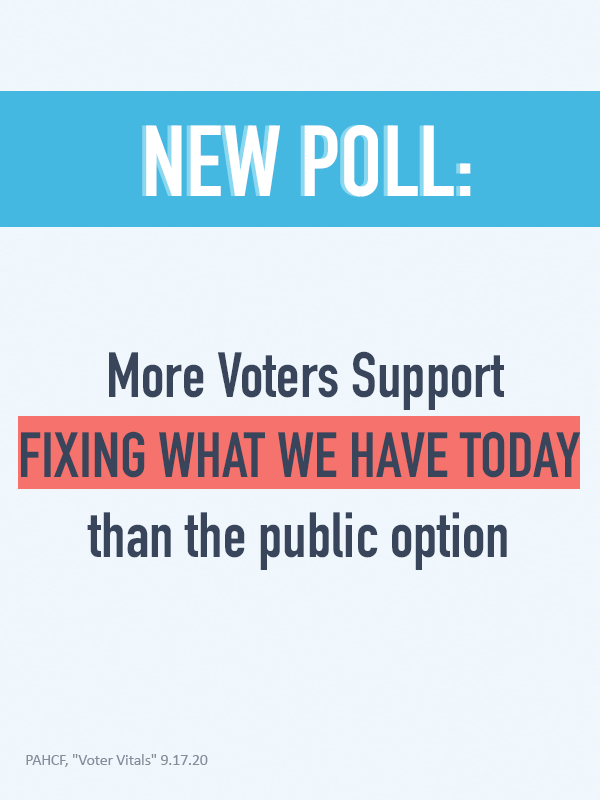VOTER VITALS IV – A Health Care Tracking Poll: National Tracking Poll Shows Voters Prefer Building On The Current System Over Creating The Public Option

MEMORANDUM
TO: Interested Parties
FROM: Lauren Crawford Shaver, The Partnership for America’s Health Care Future
RE: VOTER VITALS IV – A Health Care Tracking Poll
DATE: September 17, 2020
The fourth edition of Voter Vitals – a tracking poll conducted nationwide and in 2020 battleground states by Locust Street Group for the Partnership for America’s Health Care Future – finds “that health care remains one of the most important issues in the 2020 presidential election. During this critical time, the vast majority of voters prefer to build on our current health care system rather than create the public option. In fact, most voters are unwilling to pay any more in taxes or health care costs to create the public option.”
“The data is clear that an overwhelming majority of Americans are not willing to pay any more to create a new government health insurance system like the public option. American voters want policymakers to focus on lowering costs and improving what we have today – not starting over with the public option,” said Phillip Morris, Partner of Locust Street Group.
Key findings of the survey, which is the fourth edition of Voter Vitals include:
- Lowering COSTS (66 percent) is the top health care priority for Democratic, Swing and Republican voters.
- More voters support FIXING what we have today (66 percent support) than the public option (49 percent support) and Medicare for All (42 percent support).
- 65 percent of voters would rather BUILD ON our current health care system than create the public option.
- 79 percent of voters with health insurance coverage are SATISFIED with their coverage.
- 68 percent of voters are UNWILLING to pay any more for health care and 66 percent are UNWILLING to pay any more in taxes to create the public option.
- 63 percent of voters believe PRIVATE COVERAGE should continue to exist and have a role in our health care system.
Methodology:
- N=1,000 voters nationwide plus n=500-voter oversamples in Arizona, Florida, Iowa, Michigan, Pennsylvania and Wisconsin.
- Balanced to U.S. demographics by gender, age, race, income, political ideology and health coverage.
- Fielded online from August 27-September 4, 2020.
- National MOE: +/- 3%; State OS MOE: +/- 4%.
The fourth edition of Voter Vitals tracks closely with other national polling:
- “Americans continue to prefer a healthcare system based on private insurance (54%) over a government-run healthcare system (42%),” according to Gallup’s annual Health and Healthcare poll, which finds that a government-controlled health insurance system “remains the minority view in the U.S. This could create a challenge in a general election campaign for a Democratic presidential nominee advocating a ‘Medicare for All’ or other healthcare plan that would greatly expand the government’s role in the healthcare system.”
- And a survey by the University of Chicago Harris School of Public Policy and The Associated Press-NORC Center for Public Affairs Research, finds that Americans “are still more likely to prefer the private sector than the government on driving innovation in health care, improving quality and … providing coverage,” The Associated Press reports.
- Additionally, Gallup finds that the vast majority of Americans with private coverage rate their health care coverage (71 percent) and quality (79 percent) as ‘excellent,’ or ‘good.’
To read Locust Street’s executive summary of the survey findings, CLICK HERE.
To read Locust Street’s complete survey analysis, CLICK HERE.
The third edition of Voter Vitals was conducted in March and can be viewed HERE.
The second edition of Voter Vitals was conducted in November and can be viewed HERE.
The first edition of Voter Vitals was conducted last August and can be viewed HERE.
To learn more about the Partnership for America’s Health Care Future, CLICK HERE.